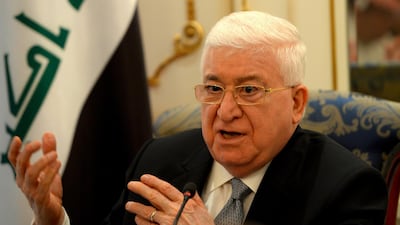Iraqi president Fuad Masum issued a decree on Monday calling parliament to convene on September 3, setting a hard deadline for politicians to form the next government and begin much-needed reform to rebuild the war-torn country.
The backroom negotiations are well under way, with parties vying to form a coalition stable enough to form a new government and maintain a majority in parliament.
In May's elections lists led by populist cleric Moqtada Al Sadr and Iranian-backed militia chief Hadi Al Amiri won the largest share of the 329 seats. However, a recount process delayed the announcement of final results until this month.
"The president has held several substantive talks with all political groups, urging them to finalize their political agreements in order to meet constitutional provisions," his office said.
______________
Read more:
Basra governor wants oil firms to build water plants
Iraq's Maliki sidelined as Kurds and Sunnis seek Sadr coalition
Iraqi grandmother in Mosul faces daily battle caring for 22 orphaned children
______________
The first session of parliament after an election is important as MPs elect a new speaker and two deputies. They will later elect a new president and task the leader of the largest bloc with forming a government as prime minister.
Mr Al Sadr, who is leading a quartet of major parties with 136 seats, needs to secure 28 more to form a parliamentary majority. He has so far brought together Sadr’s Saroon bloc, Prime Minister Haider Al Abadi’s Victory bloc, Shiite cleric Amar Al Hakim’s Wisdom bloc and Vice President Ayad Allawi’s National Alliance bloc to form a coalition.
On Monday, a delegation of representatives from the quartet of parties held talks with Kurdish leaders in Erbil on the formation of a possible parliamentary bloc.
Kurdish parties including The Patriotic Union of Kurdistan and the Kurdistan Democratic Party have collectively secured more than 40 seats in the elections.
There is still no word on how close to an agreement the parties are.
Mr Masum's statement comes as the country's electoral commission is urging parties and blocs to officially register their alliances.
Election results were only ratified by the supreme court on August 19 following allegations of fraud forced a partial recount of ballots. It gave Mr Masum 15 days to call the new parliament into session, the first step in a 90-day process outlined in the constitution that will lead to a new government.
The recount results showed little change from the initial tally, with Mr Al Sadr retaining his victory.
Meanwhile, Mr Al Abadi is heading a fragile caretaker government until its replacement can be agreed and has already had to contend with mass protests across the south at the state of basic government services.
Yet, political wrangling over who is appointed prime minister is likely to delay the process for weeks or even months.
But public frustration is increasing over poor basic service provision, high unemployment and the slow pace of rebuilding after a harsh three-year war against ISIS.
Residents of the southern city of Basra have been protesting for more than a month over political corruption and the government's failure to provide clean water and reliable power supplies.


